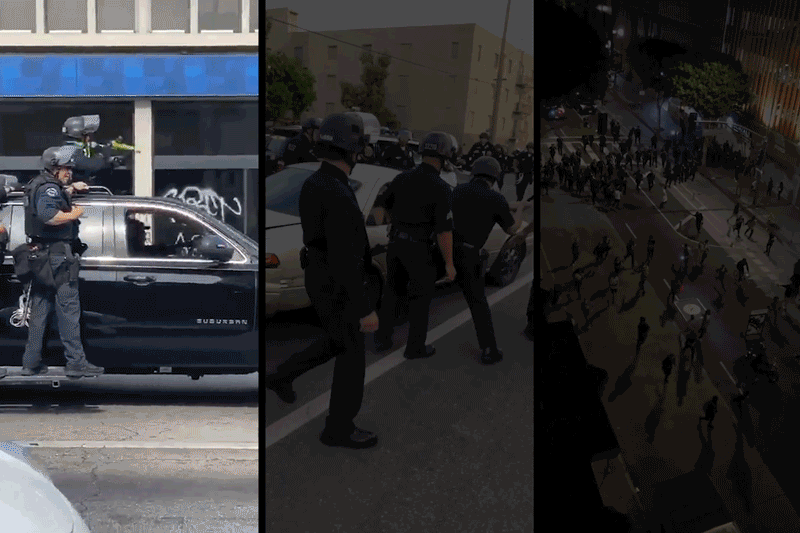[ad_1]

Independent law enforcement analysts wrapping up a review of the Los Angeles Police Department’s handling of last summer’s mass protests got an earful during two public “listening sessions” Thursday, as activists and protesters blasted the LAPD as abusive and residents questioned how the unrest was allowed to spiral into chaos.
Echoing critiques that have been made across the city and in federal court for months, many who called into the National Police Foundation’s hourlong Zoom sessions described LAPD officers in riot gear surrounding and antagonizing crowds of protesters, lashing out violently with their batons and shooting people with hard-foam projectiles at close range, at times causing serious injuries.
Baba Akili, a prominent activist with Black Lives Matter Los Angeles who spoke at a May 30 protest in Pan Pacific Park before it devolved into one of the worst clashes of the summer, said the LAPD had only two tactics — “control” and “suppress” — and had shown up looking for a fight.
“That’s what they’re taught, that’s how they operate, and that’s how they lined up that day,” Akili said.
Caller Christiana Cobb-Dozier agreed.
“The police behavior or response was unsettling. It was disruptive,” Cobb-Dozier said. “There were children present. There were families there. And it seemed like they were ready for war.”
Others, including residents who live in the surrounding Fairfax district, said they have yet to receive explanations for what they saw that night, which included police driving off in the direction of protests while organized criminal gangs burglarized and burned commercial businesses.
“From a neighborhood standpoint, it was mass chaos,” said Shelby Blecker, who lives near Melrose Avenue. “It was a very scary evening that night.”
“The destruction along 3rd Street, Fairfax and Beverly was immense. Everything that could be broken was broken. Everything that could be spray-painted was spray-painted,” said Mitchell Jacoves, another resident. “Those poor business owners didn’t deserve that.”
More than 4,000 people were arrested in L.A. in late May and early June as protesters gathered in huge numbers to demonstrate against police brutality, others burned and burglarized businesses, and city officials instituted nightly curfews. The unrest mirrored upheaval in other cities across the country as protesters demanded justice for police killings of Black people, including George Floyd in Minneapolis and Breonna Taylor in Louisville, Ky.
Most of the immediate arrests were for curfew violations and nonviolent offenses, according to data given to The Times for the first time this week, though the LAPD has worked with federal and local law enforcement partners since to track down additional individuals suspected of vandalizing and stealing from businesses.
Several lawsuits over the LAPD’s handling of the protests are pending, including a class-action suit brought by Black Lives Matter.
LAPD officials have largely defended their actions and those of their officers on the front lines, who they say acted valiantly despite being outnumbered and under attack from flying bottles and rocks. Officials have said they are investigating individual allegations of officer misconduct but have not announced any findings.
Capt. Stacy Spell, an LAPD spokesman, said Thursday that the department “is committed to ensuring policing is fair and equitable” and is cooperating fully with three separate reviews of its handling of the protests: the National Police Foundation’s, one being conducted by the City Council and an internal investigation.
Spell said he expects all three reports will be completed by next month.
The National Police Foundation’s review was first requested by the civilian L.A. Police Commission in July and will focus on the LAPD’s “tactics, deployment, command and control, and use of munitions” between May 29 and June 7, the commission has said. Commission President Eileen Decker said the review — which was funded with $350,000 from the nonprofit Los Angeles Police Foundation — would be “key to building trust and improving the department’s relationship with the community.”
Throughout Thursday’s discussions, the Rev. Jeffrey Brown, a pastor who works with the National Police Foundation and served as moderator, nodded along and thanked participants for their input, which he said would be “important for the report that’s about to be written.”
He did not give an exact date for publication.
Some callers suggested the review was inherently biased and illegitimate, and said they doubted it would hold police accountable in any real way.
“The cops are going to investigate the cops? That’s a … joke,” said Ricci Sergienko, an activist who said he was violently tackled and arrested by LAPD officers during one of the summer protests.
Times staff writer James Queally contributed to this report.
[ad_2]
Source link